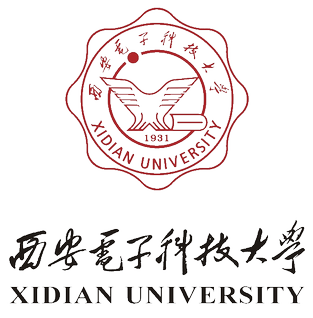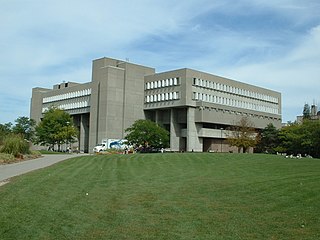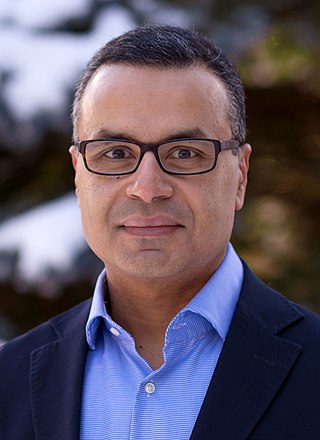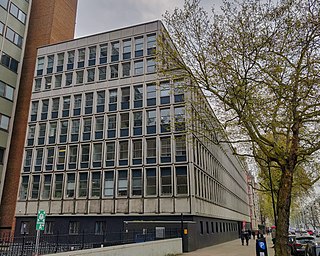
Xidian University is a public university in Xi'an, Shaanxi, China. It is affiliated with the Ministry of Education, and co-funded by the Ministry of Education, the Ministry of Industry and Information Technology, SASTIND, and China Electronics Technology Group Corporation. The university is part of the Double First-Class Construction and Project 211.
WATFIV, or WATerloo FORTRAN IV, developed at the University of Waterloo, Canada is an implementation of the Fortran computer programming language. It is the successor of WATFOR.
David Ross Cheriton is a Canadian computer scientist, businessman, philanthropist, and venture capitalist. He is a computer science professor at Stanford University, where he founded and leads the Distributed Systems Group.

The COMSATS University Islamabad (CUI), formerly known as COMSATS Institute of Information Technology (CIIT), is a public university in Pakistan. It is a multi-campus university with its principal seat located in Islamabad. Comsats was envisioned as Pakistan's first exclusive Institute of Information Technology. In the latest QS University Rankings, CUI ranked 7th in Pakistan and 801-1000 in the world. Nationally it is ranked top-most in Computer Sciences and IT category. COMSATS University Islamabad (CUI) is under the administration of the Commission on Science and Technology for Sustainable Development in the South.

The Faculty of Mathematics is one of six faculties of the University of Waterloo in Waterloo, Ontario, offering more than 500 courses in mathematics, statistics and computer science. The faculty also houses the David R. Cheriton School of Computer Science, formerly the faculty's computer science department. There are more than 31,000 alumni.
The School of Engineering and Applied Science (SEAS) at the George Washington University in Washington, D.C. is a technical school which specializes in engineering, technology, communications, and transportation. The school is located on the main campus of the George Washington University and offers both undergraduate and graduate programs.

The School of Computer Science is an academic department in the Faculty of Science at McGill University in Montreal, Quebec, Canada. The School is the second most funded computer science department in Canada. As of 2024, it has 46 faculty members, 60 Ph.D. students and 100 Master's students.

The Faculty of Engineering is a faculty of the University of Sydney, Australia. It was established in 1920 and is one of the oldest engineering schools in Australia.
The Department of Computer Science at the University of British Columbia was established in May 1968. UBC CS is located at the UBC Point Grey campus in Vancouver, British Columbia, Canada. As of September 2022, it has 65 faculty, 62 staff, 248 graduate students, and 2,763 undergraduates.

The Faculty of Engineering is one of six faculties at the University of Waterloo in Waterloo, Ontario, Canada. It has 8,698 undergraduate students, 2176 graduate students, 334 faculty and 52,750 alumni making it the largest engineering school in Canada with external research funding from 195 Canadian and international partners exceeding $86.8 million. Ranked among the top 50 engineering schools in the world, the faculty of engineering houses eight academic units and offers 15 bachelor's degree programs in a variety of disciplines.
The Luddy School of Informatics, Computing, and Engineering is an academic unit of Indiana University located on the Indiana University Bloomington (IUB) campus and on the Indiana University – Purdue University Indianapolis (IUPUI) campus. On the Bloomington campus, the School consists of the Department of Informatics, the Department of Computer Science, the Department of Information and Library Science, and the Department of Intelligent Systems Engineering. On the Indianapolis campus, the School consist of the Department of Human-Centered Computing, the Department of BioHealth Informatics, and the Department of Library and Information Science.

The University of Illinois Department of Computer Science is the academic department encompassing the discipline of computer science at the University of Illinois Urbana-Champaign. According to U.S. News & World Report, both its undergraduate and graduate programs rank in the top five among American universities, and according to Computer Science Open Rankings, the department ranks equally high in placing Ph.D. students in tenure-track positions at top universities and winning best paper awards. The department also ranks in the top two among all universities for faculty submissions to reputable journals and academic conferences, as determined by CSRankings.org. From before its official founding in 1964 to today, the department's faculty members and alumni have contributed to projects including the ORDVAC, PLATO, Mosaic, JavaScript and LLVM, and have founded companies including Siebel Systems, Netscape, Mozilla, PayPal, Yelp, YouTube, and Malwarebytes.

Raouf Boutaba is an Algerian Canadian computer scientist. His research interests are in resource, network and service management in wired and wireless networked systems. His work focuses on network virtualization, network softwarization, cloud computing, and network security.

Ihab Francis Ilyas is a computer scientist who works in data science. He is currently a professor of computer science in the David R. Cheriton School of Computer Science at the University of Waterloo. He also led the Knowledge Platform team at Apple Inc. Ihab is the holder of the Thomson Reuters-NSERC Industrial Research Chair in Data Cleaning at the University of Waterloo.

The Department of Computing (DoC) is the computer science department at Imperial College London. The department has around 50 academic staff and 1000 students, with around 600 studying undergraduate courses, 200 PhD students, and 200 MSc students. The department is predominantly based in the Huxley Building, 180 Queen's Gate, which it shares with the Maths department, however also has space in the William Penney Laboratory and in the Aeronautics and Chemical Engineering Extension. The department ranks 7th in the Times Higher Education 2020 subject world rankings.

Nadarajah Asokan is a professor of computer science and the David R. Cheriton Chair in Software Systems at the University of Waterloo's David R. Cheriton School of Computer Science. He is also an adjunct professor in the Department of Computer Science at Aalto University.

M. Tamer Özsu, FRSC is a Turkish Canadian computer scientist working in the area of distributed and parallel data management. He is a University Professor in the David R. Cheriton School of Computer Science at the University of Waterloo.

Mark Giesbrecht is a Canadian computer scientist who is the 12th dean of the University of Waterloo’s Faculty of Mathematics, starting from July 1, 2020. He was the Director of the David R. Cheriton School of Computer Science at the University of Waterloo, Canada from July 2014 until June 2020.
Thoth is a real-time, message passing operating system (OS) developed at the University of Waterloo in Waterloo, Ontario Canada.

The TUM School of Computation, Information and Technology (CIT) is a school of the Technical University of Munich, established in 2022 by the merger of three former departments. As of 2022, it is structured into the Department of Mathematics, the Department of Computer Engineering, the Department of Computer Science, and the Department of Electrical Engineering.













